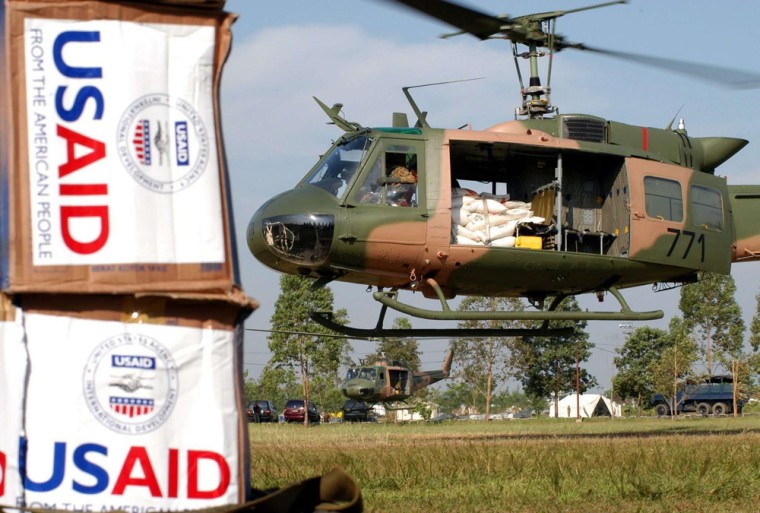The United Nations says that donations for victims of the Indian Ocean tsunami were arriving faster than they could be recorded, pushing the amount pledged toward $4 billion.
“We are recording pledges of between three and four billion dollars which shows that indeed the world is coming together in a manner we have never ever seen before,” U.N. humanitarian chief Jan Egeland said.
On Thursday, European Commission President Jose Manuel Barroso said the European Union will donate $132 million for immediate relief and look at setting up a loan for more than $1 billion for affected nations.
Barroso said he also would ask the European Parliament to approve another $461 million in aid for longer term reconstruction of countries devastated by the Dec. 26 disaster.
"I think the European Parliament is ready to be very generous," he said on the sidelines of the .
The loan would be on "very favorable terms" and administered by the European Development Bank and other international banks, he said.
U.N.: Pledges are 'phenomenal'
Egeland described the pledges made Wednesday by Germany of $674 million and by Australia of $764 million as “phenomenal” and thanked all the donors. “Be with us in the long term,” he urged.
So large were the pledges, Egeland said, that his staff had to ask donors to repeat their offers to make sure they heard correctly the number of zeros.
“Germany and Australia, if I can believe the breaking news will alone give more than a billion dollars. This is just incredible. It comes on top of the $2.5 billion we had confirmed as of yesterday. We are just not able to record all the generous offers, they are coming in so often and they are so big,” he said.
Egeland said aid pledges last year were unimpressive, with a total of $5.8 billion committed for 100 countries where the United Nations operates.
“This year is different,” he said. “This is the year of compassion and from now on it should be like this.”
He said there might have been a comparable outpouring of aid in African emergencies if they had received as much TV coverage as the Indian Ocean tsunami.
“There was no such coverage of the 1.6 million refugees that were nearly in a ‘tsunami’ of killing and scorched earth tactics that were displaced in Darfur. If there had been the same kind of video clips I think we might have had a comparable response. In the Congo there is also not that kind of response because there is no coverage.”
He repeated his criticism that usually rich nations did not give enough to help those in need. “There are 30-40 rich nations and they are all giving too little on average.”
“I appeal to oil-rich nations to step up to the plate,” he said. “They should be giving more of their riches.”
Egeland warned that unless countries made sure their pledges did not take away from money earmarked for other humanitarian emergencies, there was a danger the year would start with “unparalleled generosity” and finish with “stinginess.”
He urged governments to ensure that the money they were pledging to the tsunami was on top of funds earmarked for other crises. “Human life is of as much worth in Sudan as it is in Sri Lanka or Thailand,” he said.
Asked to explain why he thought the response to the tsunami crisis had been so great, Egeland said there were “many reasons” but highlighted the media coverage of the disaster. “It’s what we see at our TV screens which is the driving force,” he said.
He also said the involvement of nationals from many donor countries in the disaster may have also contributed to the high levels of giving. “In some countries it means a lot that they have lost their own citizens.”
Donors in the region were also motivated to help their neighbors, he said.
Egeland warned warring parties in Aceh, the Tamil areas of Sri Lanka and parts of Somalia to maintain their cease-fires if they wanted aid to continue to flow in.
“We have a message to the parties to the conflicts. Suspend your conflict and work together with us to help your own people. ... We need that cease-fire, that peace to hold because if new conflict breaks out we cannot help the people.”
The relief effort in the Indian Ocean region would go down in the history books as the “most effective” ever, he said.
Egeland said there had been a very good response to his latest wish list and that the United States and Britain were now offering C-17 planes. Singapore has offered heavy-lifting helicopters, helicopter carriers and boats.
The United States is contributing 50 helicopters to the relief effort, but Egeland said hundreds more were needed because it would be many months before aid could reach some areas by road. “In Sumatra we will need helicopters for a year or more,” he said.
And although hundreds of thousands of tsunami victims were getting water and sanitation, hundreds of thousands more were getting inadequate or no supplies, he said.
“Nowhere do we have bigger problems than in Aceh and Sumatra,” he said, describing the coastal town of Meulobah as “ground zero.”
